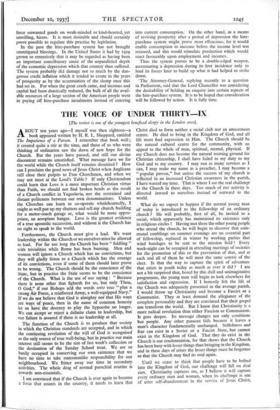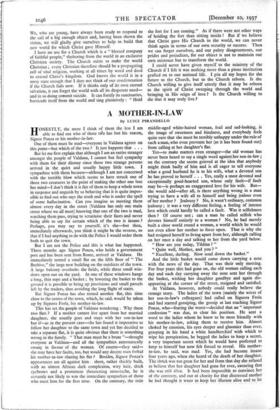THE VOICE OF UNDER TIfIRTY-IX
[The writer is one of the youngest beneficed clergy in the London area].
ABOUT ten years ago—I myself was then eighteen—a book appeared written by H. R. L. Sheppard, entitled The Impatience of a Parson. I remember that book well ; it' created quite a stir it the time, and those of us who were thinking of ordination saw the dawn of new hope for the Church. But the years have passed, and still our divine discontent remains unsatisfied. What message have we for the world while the Church itself remains disunited ? How can I proclaim the good news of Jesus Christ when Anglicans still close their pulpits to Free Churchmen, and when we may not meet at the Lord's Table? If only Christendom could learn that Love is a more important Christian virtue than Faith, we should not find broken heads as the result of a Church conflict in Yugoslavia, nor the restrained and distant politeness between our own denominations. Unless the Churches can learn to co-operate wholeheartedly, I might as well put up my shutters and sell my church building for a motor-coach garage or, what would be more appro- priate, an aeroplane hangar. Love is the greatest evidence of a true apostolic succession, and without it the Church has no right to speak to the world.
Furthermore, the Church must give a lead. We want leadership within the Church or we ourselves niust be allowed to lead. For far too long the Church has been" fiddling" with trivialities while Rome has been burning. Men and wOmen 'ignore a Church which has no convictions, but they Will gladly listen to a Church which has the courage of its Convictions, Oven if some of them should later prove to be wrong. The Church should be the conscience of the State, but in practice the State seems to be the conscience of the Chureh. What is the use of our saying : "Because there is none other that fighteth for us, but only Thou, 0 God," if Our Bishops add the words sotto voce "plus a strong Air Force, a reinforced Army, a well-equipped Navy." If we do not believe that God. is almighty neof that His ways are ways' of peace, then in the name of common honesty let tis have the decency to play the hypocrite nb longer. We can accept or reject a definite claim to leadership, but our failure is assured if there is no leadership at all The function of the Church is to produce that society in which. the Christian standards are accepted, and in which the continuing revelation of the will of God is -recognised as the only source of true well-being, but in practice our main interest still seems to be ,the size of Iasi week's collection or the destination of the Sunday School treat. We are so busily occupied in conserving our own existence that we have no time to' take statesmanlike responsibility for our neighbourhOod. • We fritter away 'our time in secondary activities. The whole 'drag of normal parochial routine is towards nOn-essentials... . . . am convinced that if the Church is ever again to become a force that counts in the country, it needs to leant that Christ died to form neither a social club nor an amusement centre. He died to bring in the Kingdom of God, and all life must find expression in Him. The Church should be the natural cultural centre for the community, with an appeal to the whole of man, spiritual, mental, physical. If my Church does not become the natural training ground for Christian citizenship, I shall have failed in my duty to my God and to my country. I may run as many services as I can, I may make my name as a preacher, I may become a "popular parson," but unless the success of my church is reflected in an increased Christian awareness in the parish, I have wasted my time. That is where I see the real challenge to the Church in these days. Too much of our activity is directed inward to ourselves instead of outward to the world.
What do we expect to happen if the normal young man of today is introduced to the fellowship of an ordinary church ? He will probably, first of all, be invited to a social, which apparently has maintained its existence only in religious circles ! Having met there the other young people who attend the church, he will begin to discover that com- munal ramblings on summer evenings are an essential part of fellowship, replaced in winter by working parties that wind bandages to be sent to the mission field ! Every week-night can be occupied in attending meetings of societies for the promotion of this or the prevention of that, and at each and all of them he will meet the same coterie of the elect. Is that the way to capture the spirit of adventure that exists in youth today as much as ever it did ? I am not a bit surprised that, bored by this dull and unimaginative programme, the young man will begin to look elsewhere for satisfaction and expression. If I honestly felt the life of the Church was adequately presented in the average parish, I would throw up Christianity and become a Fascist or a Communist. They at least demand the allegiance of the complete personality and they are convinced that their gospel can transform the world. But I know that Christianity is a more radical revolution than either Fascism or Communism. It goes deeper. Its message changes not only conditions but people. Any other panacea fails because it leaves a man's character fundamentally unchanged. Selfishness and fear can exist in a Soviet or a Fascist State, but cannot exist in the Kingdom of God. That they do exist in the Church is our condemnation, for that shows that the Church has been busy with lesser things than bringing in the Kingdom, and in these days of crises the lesser things must be forgotten so that the Church may find its soul again.
Until we cease to think that people have to be bribed into the Kingdom of God, our challenge will fall on deaf &alt. Christianity captures me, as I believe it will capture eveiy ordinary man and woman, when its challenge is one Of utter self-abandonment in the service of Jesus Christ. We, who are young, have always been ready to respond to the call of a big enough object and, having been shown the vision, we will gladly give ourselves to help to build that new world for which Christ gave Himself.
I have no use for a Church which is a "blessed company of faithful people," sheltering from the world in an exclusive Christian society. The Church exists to make the world Christian ; every Christian therefore should be a propagating cell of vital religion, working at all times by word and deed to extend Christ's kingdom. God knows the world is in a sorry state enough that I dare not think of our condemnation if the Church fails now. If it thinks only of its own eternal salvation, it can forget the world with all its desperate need— and in so doing commit suicide. It can fortify its sanctuaries, barricade itself from the world and sing plaintively : "Hold the fort for I am coming." As if there were not other ways of holding the fort than sitting inside ! But if we believe that Christ gave His Church to the world, we can never think again in terms of our own security or success. Then we can forget ourselves, and our paltry disagreements, our prides and prejudices, for our object is not to maintain our own existence but to transform the world.
I could never have given myself to the ministry of the Church if I felt it was nothing more than a pious institution grafted on to our national life. I pin all my hopes for the future to the Church, but to the Church reborn. Is the Church willing to give itself utterly that it may be reborn as the spirit of Christ sweeping through the world and bringing in His reign of love ? Is the Church willing to die that it may truly live ?























































 Previous page
Previous page